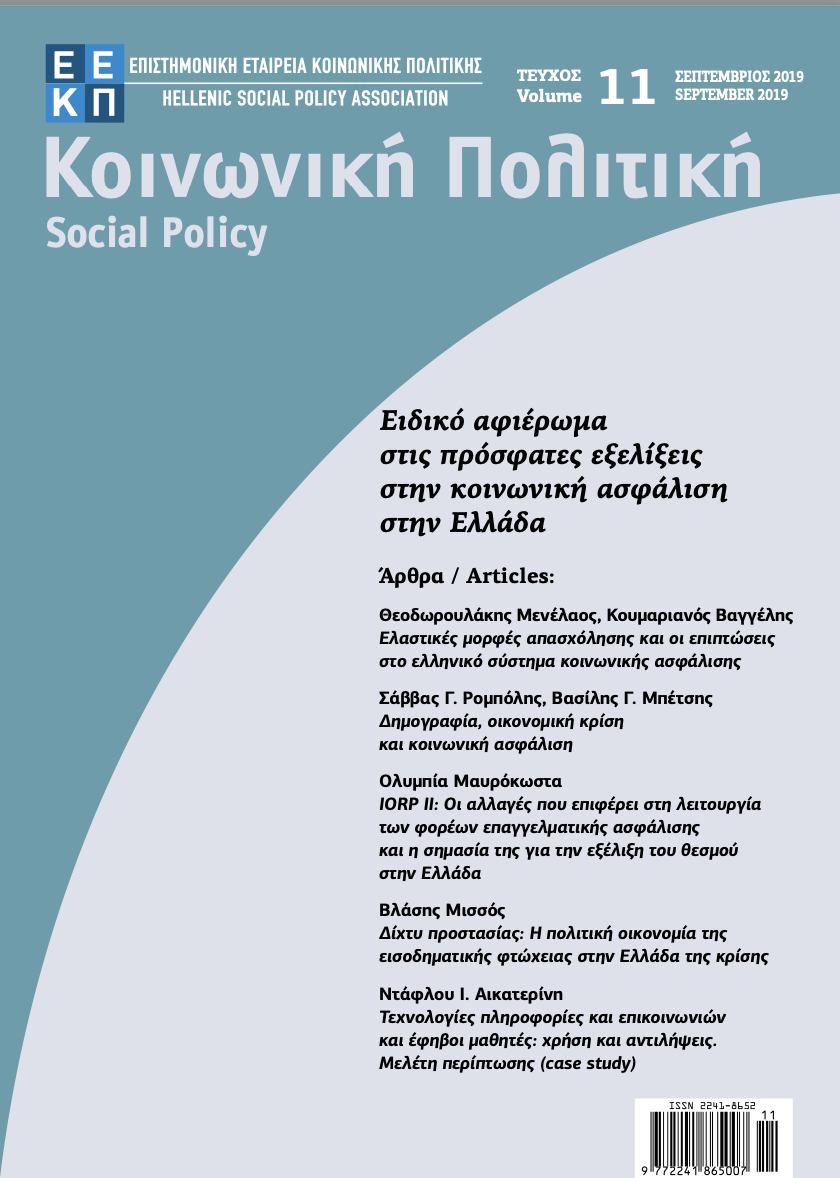Δίχτυ προστασίας: Η πολιτική οικονομία της εισοδηματικής φτώχειας στην Ελλάδα της κρίσης
Аннотация
Το δίχτυ προστασίας αποτελεί θεσμική έκπτωση των αναπτυξιακών διαστάσεων του Κοινωνικού Κράτους. Η εφαρμογή του στην Ελλάδα κατά την περίοδο της παρατεταμένης ύφεσης είναι συνε- πής με τους κανόνες δημοσιονομικής πειθαρχίας και τις πολιτικές δημοσιονομικής προσαρμογής και εσωτερικής υποτίμησης. Στο παρόν κείμενο εξετάζεται το γενικότερο δημοσιονομικό σκε- πτικό λειτουργίας του νέου υποτιμημένου μηχανισμού επιδοματικής πολιτικής και ο ρόλος του στη διαχείριση της εισοδηματικής φτώχειας. Παράλληλα, προτείνεται ένας διαφοροποιημένος δείκτης αποτύπωσης του ποσοστού φτώχειας, ώστε να παρακαμφθούν οι αδυναμίες που χαρα-κτηρίζουν τη συμβατική εκδοχή του. Η παρουσίαση των αποτελεσμάτων βασίζεται σε πρωτότυπη επεξεργασία μικροδεδομένων των Ερευνών Εισοδήματος και Συνθηκών ∆ιαβίωσης (SILC).
Article Details
- Как цитировать
-
Μισσός Β. (2021). Δίχτυ προστασίας: Η πολιτική οικονομία της εισοδηματικής φτώχειας στην Ελλάδα της κρίσης. Κοινωνική Πολιτική, 11, 74–96. https://doi.org/10.12681/sp.29017
- Выпуск
- Том 11 (2019)
- Раздел
- Άρθρα

Это произведение доступно по лицензии Creative Commons «Attribution» («Атрибуция») 4.0 Всемирная.
Οι συγγραφείς των άρθρων που δημοσιεύονται στο περιοδικό διατηρούν τα δικαιώματα πνευματικής ιδιοκτησίας επί των άρθρων τους, δίνοντας στο περιοδικό το δικαίωμα της πρώτης δημοσίευσης. Άρθρα που δημοσιεύονται στο περιοδικό διατίθενται με άδεια Creative Commons 4.0 και σύμφωνα με την άδεια μπορούν να χρησιμοποιούνται ελεύθερα, με αναφορά στο/στη συγγραφέα και στην πρώτη δημοσίευση για μη κερδοσκοπικούς σκοπούς και με δικαίωμα τροποποίησης μόνον με παρόμοια διανομή (αν αναμείξετε, τροποποιήσετε, ή δημιουργήσετε πάνω στο υλικό, πρέπει να διανείμετε τις δικές σας συνεισφορές υπό την ίδια άδεια όπως και το πρωτότυπο).



